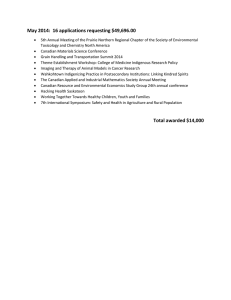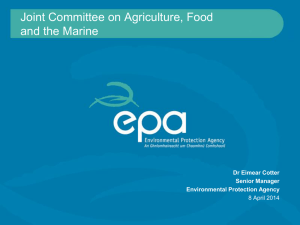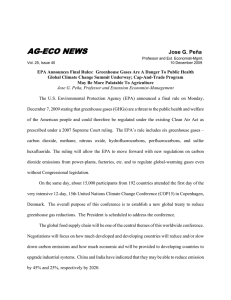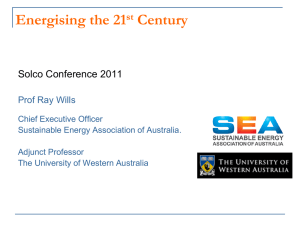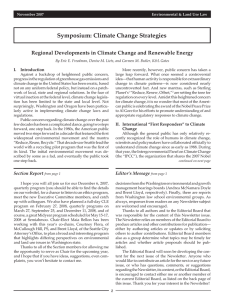Canadian News and Legal Update 11/11/10
advertisement
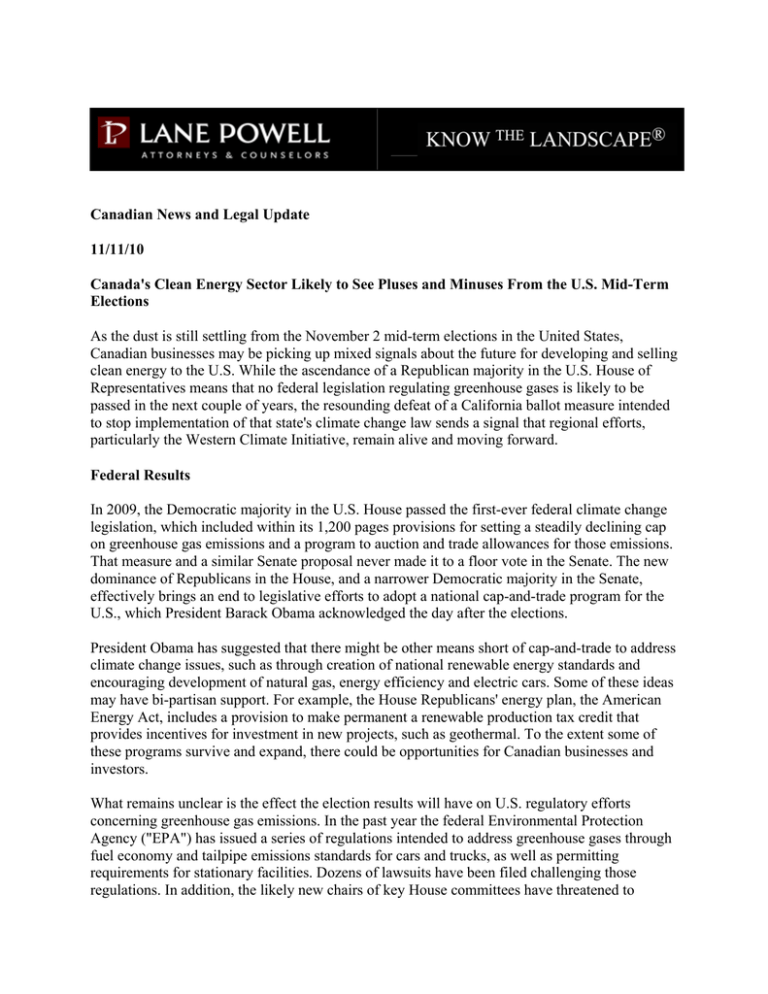
Canadian News and Legal Update 11/11/10 Canada's Clean Energy Sector Likely to See Pluses and Minuses From the U.S. Mid-Term Elections As the dust is still settling from the November 2 mid-term elections in the United States, Canadian businesses may be picking up mixed signals about the future for developing and selling clean energy to the U.S. While the ascendance of a Republican majority in the U.S. House of Representatives means that no federal legislation regulating greenhouse gases is likely to be passed in the next couple of years, the resounding defeat of a California ballot measure intended to stop implementation of that state's climate change law sends a signal that regional efforts, particularly the Western Climate Initiative, remain alive and moving forward. Federal Results In 2009, the Democratic majority in the U.S. House passed the first-ever federal climate change legislation, which included within its 1,200 pages provisions for setting a steadily declining cap on greenhouse gas emissions and a program to auction and trade allowances for those emissions. That measure and a similar Senate proposal never made it to a floor vote in the Senate. The new dominance of Republicans in the House, and a narrower Democratic majority in the Senate, effectively brings an end to legislative efforts to adopt a national cap-and-trade program for the U.S., which President Barack Obama acknowledged the day after the elections. President Obama has suggested that there might be other means short of cap-and-trade to address climate change issues, such as through creation of national renewable energy standards and encouraging development of natural gas, energy efficiency and electric cars. Some of these ideas may have bi-partisan support. For example, the House Republicans' energy plan, the American Energy Act, includes a provision to make permanent a renewable production tax credit that provides incentives for investment in new projects, such as geothermal. To the extent some of these programs survive and expand, there could be opportunities for Canadian businesses and investors. What remains unclear is the effect the election results will have on U.S. regulatory efforts concerning greenhouse gas emissions. In the past year the federal Environmental Protection Agency ("EPA") has issued a series of regulations intended to address greenhouse gases through fuel economy and tailpipe emissions standards for cars and trucks, as well as permitting requirements for stationary facilities. Dozens of lawsuits have been filed challenging those regulations. In addition, the likely new chairs of key House committees have threatened to launch investigations into the EPA's authority and bases for taking such actions. The election also has given new life to proposed legislative efforts to put a halt to EPA's regulation of greenhouse gas emissions. While the President could veto such legislation, much remains uncertain about how that process might play out, particularly as the new majority in the House also vows to undo the health care law passed last year. Regional Efforts As the federal efforts falter, the climate change and clean energy focus is likely to become more regional, for example through the cap-and-trade system being developed by the Western Climate Initiative ("WCI"). California in particular will play a significant role now that a large margin of voters in the November 2 election rejected California's Proposition 23. That measure would have halted the state's climate change law indefinitely. Its defeat means that the California Air Resources Board ("CARB") can move forward with a planned December 2010 adoption of a cap-and-trade program, which it will harmonize with WCI's system. While only California and the Canadian provinces of British Columbia, Ontario and Quebec are participating in WCI's capand-trade, the defeat of Proposition 23 means that California's inclusion in the program, with a state economy that is larger than 90 percent of the countries in the world, will provide Canadian investors and businesses with access to a substantial carbon trading market. The rejection of the California ballot measure also keeps alive the authority of that state's regulators to continue with ambitious standards for renewable energy. In September, CARB adopted a goal of obtaining one-third of the state's energy from renewable sources by 2020. This standard includes allowing out-of-state generating sources to sell renewable power to California and allows California utilities to buy renewable energy credits for projects built out-of-state that do not provide electricity to the state and, thus, could provide a big boost for Canadian renewable projects. For more information, please contact the Canada Practice Group at Lane Powell: 206.223.7000 Seattle 503.778.2100 Portland canadianlaw@lanepowell.com www.lanepowell.com We provide the Canadian News and Legal Updates as a service to our clients, colleagues and friends. It is intended to be a source of general information, not an opinion or legal advice on any specific situation, and does not create an attorney-client relationship with our readers. If you would like more information regarding whether we may assist you in any particular matter, please contact one of our lawyers, using care not to provide us any confidential information until we have notified you in writing that there are no conflicts of interest and that we have agreed to represent you on the specific matter that is the subject of your inquiry. Copyright © 2010 Lane Powell PC www.lanepowell.com Seattle - Portland - Anchorage - Olympia - Tacoma - London 2

